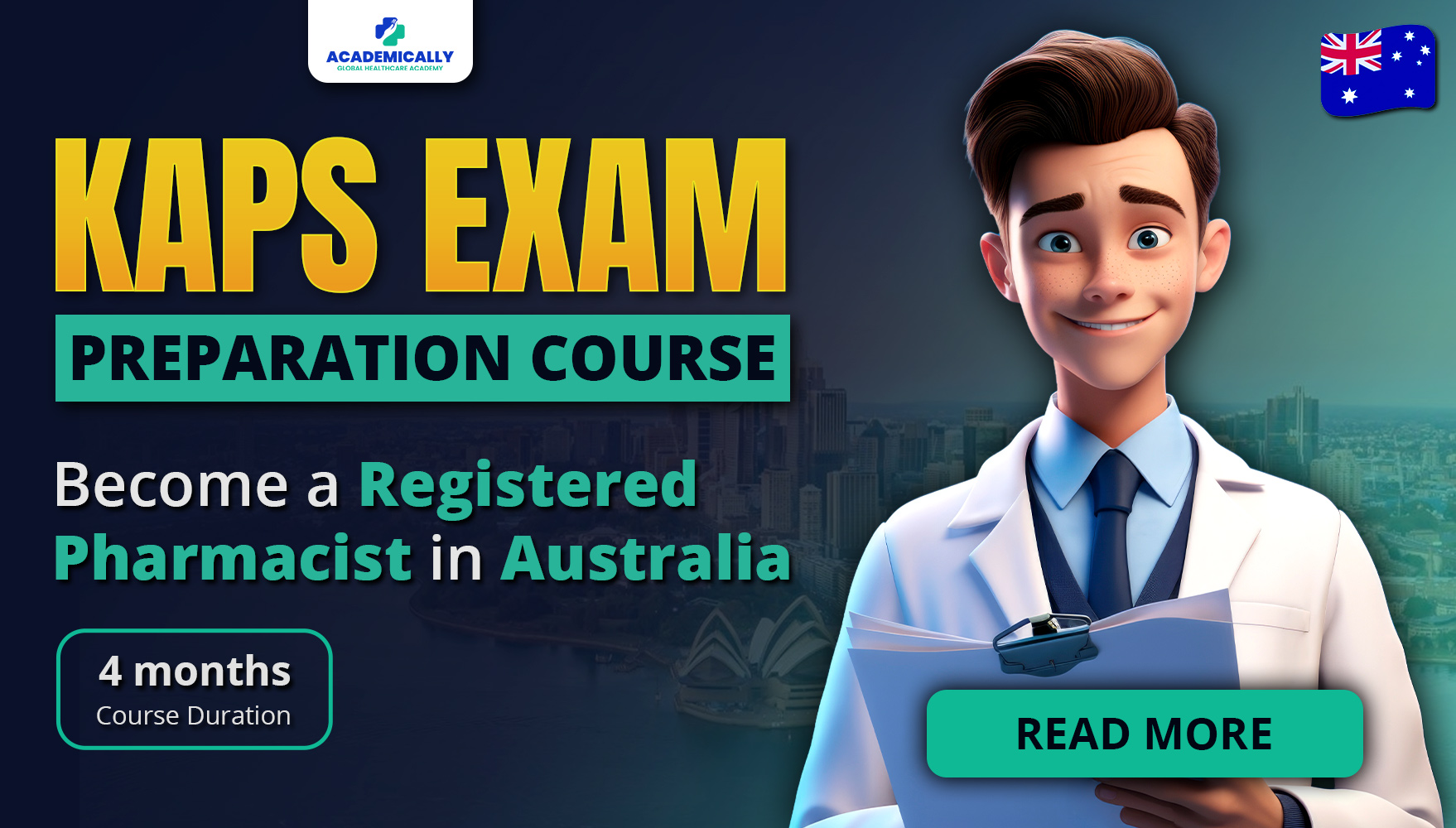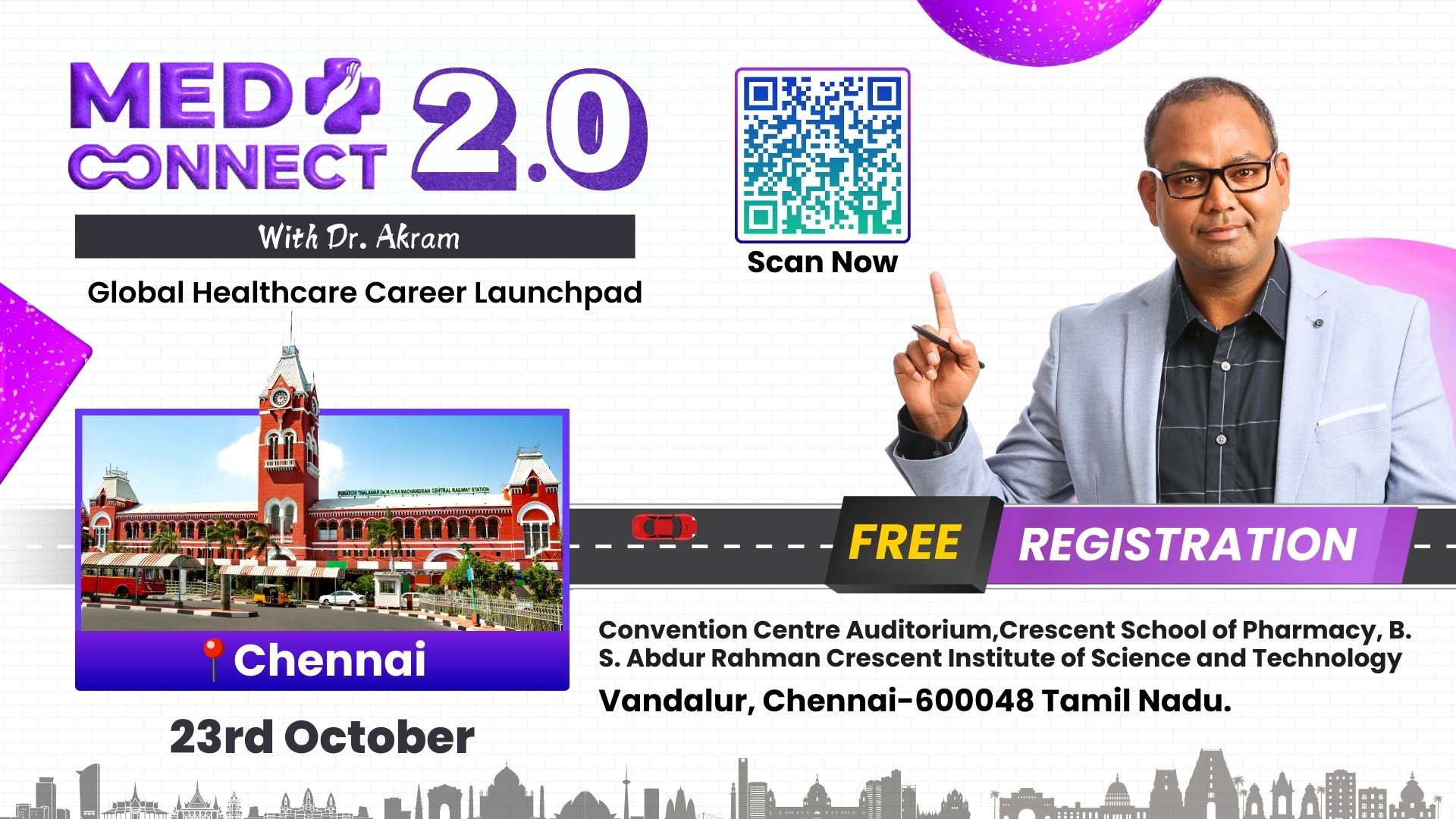Introduction
The Knowledge Assessment of Pharmaceutical Sciences, commonly known as the KAPS exam, is an integral part of seeking registration to practise pharmacy in Australia. This assessment determines the skills and knowledge of the overseas-trained pharmacists aiming to practise in Australia.
Clearing this exam is a significant professional milestone and opens doors to endless career opportunities in Australia. Successful completion of this assessment also paves the way for career advancement, international recognition, competency in practice, and credibility in the eyes of the public.
In this blog, we will delve into the complete syllabus and the key topics aspiring candidates need to master to excel in the KAPS exam.
Introduction to the KAPS Exam
As a result of the rising demand for pharmacists in Australia, the healthcare industry is inviting international pharmacists to practise in Australia. The candidates should clear the KAPS exam to be eligible for registration and practice.
The KAPS exam, administered by the Pharmacy Board of Australia, consists of two parts: Part I and Part II. Each paper consists of 100 questions and should be completed on the same day.
Part I focuses on foundational knowledge and principles, while Part II assesses the application of this knowledge in a clinical context.

KAPS Exam Syllabus
A thorough understanding of the complete syllabus and all the essential topics of the KAPS exam is extremely crucial when you are planning to write the KAPS exam. Familiarising yourself with the different concepts included in the syllabus will help you prepare well and become more confident in your performance.
When you understand the syllabus properly and prepare well, it will lead the way to guaranteed success.
The KAPS exam is quite simple when the right preparation strategies are adopted. Since this exam thoroughly assesses your knowledge and skills to practise in the Australian context, you must be well-equipped to meet the standards set by the Australian healthcare system.
Here is a detailed list of the topics included in the KAPS exam syllabus.
Part I: Foundations of Pharmaceutical Sciences
Pharmaceutical Chemistry:
- Inorganic chemistry
- Organic chemistry
- Medicinal chemistry
Physiology and Pharmacology:
- Human physiology
- Pharmacodynamics and pharmacokinetics
Pharmaceutics:
- Pharmaceutical dosage forms
- Pharmaceutical technology
- Biopharmaceutics
Pharmacotherapy and Medication Management:
- Therapeutics
- Medication management
Quality Use of Medicines:
- Medication safety
- Medication adherence
Pharmaceutical Chemistry
Organic Chemistry
- Nomenclature
- Drug class recognition
- Reaction types
- Functional group reactivity
- Drug stability
- Acid-base reactions
Stereochemistry
- Nomenclature
- Optical activity
- Geometric isomerism
- Conformation
Physical and Inorganic Chemistry
- Kinetics
- Acid-base reactions
- Phase equilibria
Analytical Chemistry
- Spectroscopy
- Redox reactions
- Assay techniques
- Diagnostic agents
Biochemistry
- Nomenclature
- Structures
- Biochemical classes
- Thermodynamics
- Biochemical pathways
Structure-activity Relationships
- Relationship between a chemical or 3D structure and its biological activity
Medicinal Chemistry
- Structure-activity relationships
- Drug presentation and delivery
- Drug formulation and stability
- Drug metabolism
- Mechanism of drug action
- Modern drug development
- Absorption, distribution and elimination of drugs
Drug Metabolism
- Breakdown and conversion of medicines through regularly occurring bodily processes, leading to active ingredients and by-products of the original medicine
Pharmacology and Physiology
Biochemical Pharmacology
- Principles of drug action
- Drug interactions
- Receptor pharmacology
- Autonomic transmission
- Endocrine pharmacology
- Cardiovascular pharmacology
- Anti-inflammatory agents and analgesics
- Antibiotics
- Diuretics
- Local and general anaesthetics
- Vitamins
- Drugs affecting nutritional and metabolic function
- Drugs affecting the central nervous system
Systemic Pharmacology
- The mechanism of drug action as it relates to specific organs and disease states
Chemotherapy
- Antibacterial drugs
- Antiviral drugs
- Antifungal drugs
- Antiprotozoal drugs
- Anthelmintic drugs
- Anticancer drugs
Toxicology
- Common side effects
- Signs of toxicity
- Mechanism of toxicity
Pathophysiology
- Alteration of physiological processes by drugs or states of diseases
General Physiology
- Normal bodily functions, including but not limited to the central nervous, digestive, cardiovascular, lymphatic, nervous, respiratory, urinary, endocrine and reproductive systems and their integration.
- Blood and other body fluids
Part II: Advanced Pharmacy Practice
Clinical Pharmacy:
- Patient assessment
- Therapeutic drug monitoring
- Disease management
Advanced Pharmacotherapy:
- Cardiology
- Endocrinology
- Infectious diseases
- Neurology
- Respiratory medicine
Evidence-Based Practice:
- Critical appraisal of literature
- Application of evidence in practice
Practice-Based Research:
- Design and conduct of research projects
- Data analysis and interpretation
Professional and Ethical Practice:
- Legal and ethical aspects of pharmacy
- Communication skills
- Collaborative practice
Pharmaceutics
Physical Pharmacy
- Solvents
- Types of preparation
- Solutions
- Suspensions
- Emulsions
Biopharmaceutics
- Dissolution
- Drug absorption
- Bioavailability and bioequivalence
- Drug interactions with a biopharmaceutical basis
Pharmacokinetics and Pharmacodynamics
- Biological half-life
- Elimination rate constants
- Apparent volume of distribution
- Clearance
- Steady-state considerations
- Drug protein binding
- Drug metabolism
- Drug interactions
- Pharmacogenetics
- Relevant calculations
Pharmaceutical Microbiology
- Preservation
- Antimicrobial agents
- Sterilisation technology
Formulation
- Formulation of drugs for various routes of administration
- Parenteral dose forms
- Controlled release preparations
- Evaluation of particular dose forms
Dose Forms, Including Extemporaneous Preparation
- Drug products
- Constituent drug substances
- Combination of compounded products for use via various routes of administration
Therapeutics
Calculations
- Dilutions
- Percentages
- Densities
- Sensitivity of balance
- Proportions
- Isotonicity
- Milliequivalents and milliosmoles
- Buffers
- Dose calculations from body weight or surface area
- Stability
Posology and Dose Determinations
- Appropriate dosages of common medications
- Dosage regimens of common medications
Medicine Choice
- Demonstrating a clear idea of the clinical processes used for selecting the most appropriate drug for the presenting patient and their condition
Surgical Dressings, Applications, and Associated Drug Delivery Systems
- Drug choices for surgical dressings
- The usage of and choices for surgical dressings
Adverse Reactions to Drugs
- Adverse reactions to drugs
- Relevant patient counselling and advice
Drug Interactions
- Drug interactions
- Relevant patient counselling and advice
Drug Information
- Using various sources of information to find drug and health information relevant to conditions and states of diseases
Managing Minor Ailments
- Non-prescription prescribing
- Diagnosing minor illness
- Rational over-the-counter product selection
- Over-the-counter drug information
While preparing for the KAPS exam, it is essential to know that in Paper I, a significant portion of questions, approximately 30%, revolves around pharmaceutical chemistry. The rest of the questions, around 70%, are from physiology and pharmacology. In Paper II, a similar pattern is observed as almost 30% of the questions are based on pharmaceutics, while the remaining 70% are related to therapeutics.
The KAPS exam is a challenging yet rewarding step for pharmacists seeking to advance their careers. By mastering the diverse topics covered in Part I and Part II, candidates can confidently demonstrate their expertise in pharmaceutical sciences and clinical pharmacy. Diligent preparation and a strategic study plan will empower aspiring pharmacists to navigate the depths of knowledge and emerge victorious in the KAPS examination.
Preparation Strategies
- Create a Study Plan:
- Break down the syllabus into manageable sections.
- Allocate dedicated time for each topic.
- Utilise Available Resources:
- Textbooks, reference materials, and online resources are invaluable.
- Practice questions and mock exams help assess your understanding.
- Stay Updated:
- Keep abreast of recent advancements and changes in pharmacy practice.
- Collaborate and Seek Guidance:
- Join preparatory courses to discuss concepts and clarify doubts.
- Seek advice from mentors or experienced professionals.
- Practise Time Management:
- Simulate exam conditions during practice to enhance time management skills.
Why is the KAPS Exam Important for Pharmacists?
The KAPS exam is a part of the ongoing professional development of pharmacists. Successfully navigating this challenging assessment demonstrates a commitment to continuous learning, enhancing the credibility of pharmacists as healthcare professionals dedicated to maintaining and advancing their knowledge.
Successful completion of the KAPS exam is a prerequisite for obtaining professional accreditation as a pharmacist in Australia. It is a mandatory requirement set by the Pharmacy Board of Australia, emphasising the importance of a standardised assessment to ensure a high level of competence among practising pharmacists.
The KAPS exam, administered in Australia, holds global recognition as a standardised assessment for pharmacists. This recognition is valuable for pharmacists who may consider practising internationally or collaborating on a global scale, contributing to the standardisation of pharmaceutical practice worldwide.
To start your KAPS preparation journey, get in touch with our experts today!
Fill up this form for a free one on one counselling session.





